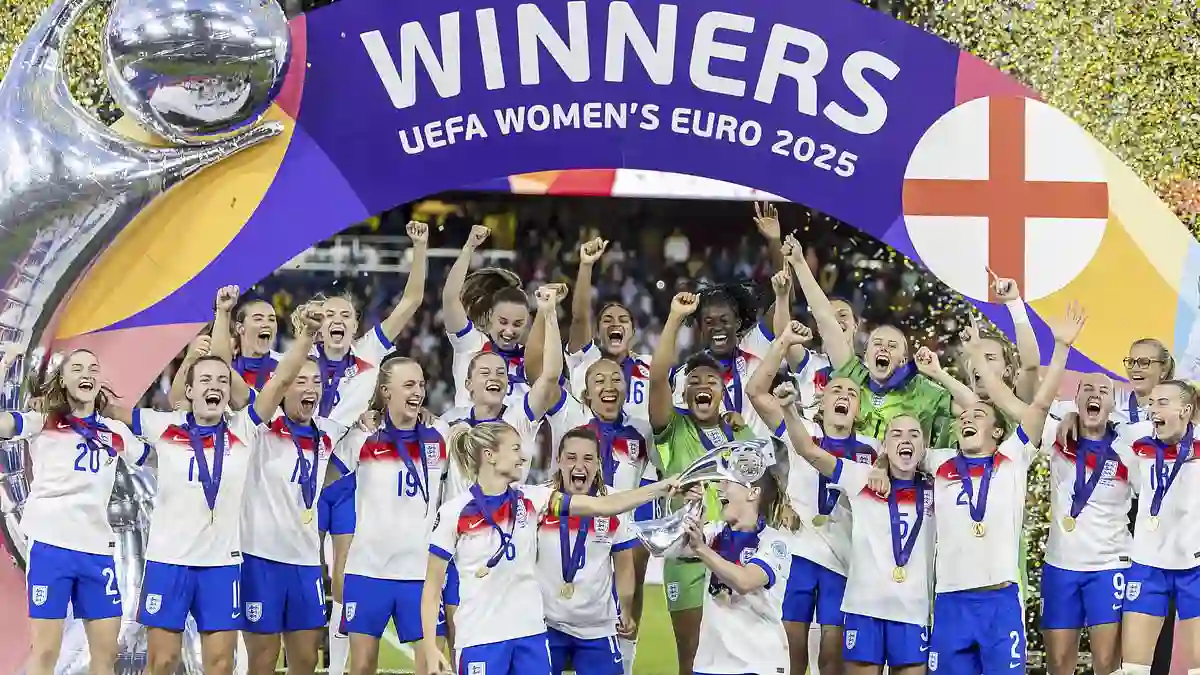It all began as a regular Sunday evening. The cricket Test between England and India at Old Trafford had just wrapped up without much fanfare—a draw that meandered rather than thrilled.
After the match, I listened to Ben Stokes share his thoughts at the press conference, then headed back to the media centre.
But as soon as I walked in, everything changed.
A small group of us huddled around a laptop, completely transfixed—not by cricket this time, but by a penalty shootout in Basel.
It was England versus Spain in the final of the Women’s Euros. And when Chloe Kelly slotted home the decisive kick, the room erupted.
From a Pub in Manchester to a Music Festival in the Countryside
Later that night, I strolled toward my car along Warwick Road in Manchester.
There’s a pub on the way, The Bishop Blaize—a go-to spot for United fans on match days. Normally, it’s packed with songs, chants, and red shirts. But this time, it was different.
Inside, the place was buzzing with England football fans—watching Leah Williamson lift the European Championship trophy.
All around the room, legendary photos of Cantona, Best, Solskjaer, and Sir Jimmy Anderson lined the walls.
But every single television? Showing the women’s final. That said everything.
Back home, it turned out my whole family had tuned in too—my eldest daughter caught the match in a packed pub with friends, my younger daughter watched it with her mum, and my son heard the result shouted over the speakers at a music festival.
It wasn’t just a game; it was a national moment.
The Women’s Euros Took Over, While the Men’s Club World Cup Barely Registered
That night, it hit me: the Women’s Euros had dominated our collective attention far more than the men’s Club World Cup.
While FIFA tried hard to sell that tournament as the ultimate spectacle, it just didn’t connect.
In fact, I struggled to even find a bar in London showing the final—even though Chelsea won it.
The Euros, on the other hand, were unavoidable. They were on free-to-air TV, talked about at every dinner table, and even getting mentions in the honours lists. You can expect a parade.
You can expect more awards. Chloe Kelly might even be in the running for Sports Personality of the Year.
This Isn’t New—It’s Just Louder Now
None of this should really come as a surprise. Women’s football in England has been building steadily for two decades.
It’s had its setbacks—attendances in the Women’s Super League dipped 10% last season—but moments like Sunday night’s make a difference.
They give it momentum again.
There are always going to be critics. That’s fine. No one is forcing anyone to watch women’s football.
But if someone prefers a half-hearted summer cash-grab friendly between two Premier League clubs who’ll be moaning about fatigue come August, then let them have it.
Men Tried to Kill It. Women Brought It Back Stronger
There’s a special irony in how some men—mostly online—still scoff at women’s football, as if it offends some deep-rooted masculine tradition.
This, in a country where it was men who literally banned women from playing football for 50 years.
That setback delayed generations of growth, but it didn’t stop it forever.
Now, those dismissive voices are becoming background noise.
They’re getting drowned out by roaring crowds, packed stadiums, and thrilling finals that grab the nation’s attention.
Power Isn’t Everything—Skill, Heart, and Drama Count Too
Here’s the thing: sport isn’t just about who’s stronger or faster. It’s about vision.
It’s about subtlety. It’s about storylines that draw you in and moments that make your heart race.
Take Wimbledon, for example. The best match I watched this year? Emma Raducanu’s third-round battle against Aryna Sabalenka.
A breathtaking, edge-of-your-seat match that had all the emotion and intensity you’d expect from the biggest stages.
Would Djokovic beat them both? Of course. But that doesn’t make their match any less thrilling.
I’m Not a Diehard Fan, But I Was Gripped
Look, I won’t pretend I’m a weekly watcher of the women’s game. I didn’t even travel to Switzerland for the Euros.
But I watched the semi-final against Italy. And when 17-year-old Michelle Agyemang equalised late in added time? It was electric.
She turned the game on its head. That was sport at its finest.
Moments like that are why people fall in love with football—whatever the gender.
The Backlash Is Losing Ground
Some still act like women’s football is a threat to tradition. They behave as though it has no place in the sporting world.
But every time England triumphs, every time the country celebrates, those arguments sound more and more out of touch.
We’re watching the growth of something powerful, and there’s no reversing it now.
Just Sit Back and Enjoy the Rise
Sunday night wasn’t just about lifting a trophy. It was another rung climbed on a ladder that’s been years in the making.
The women’s game in England has taken another giant step forward.
You don’t have to be a convert. You don’t have to watch every match.
But maybe now’s the time to stop fighting it—and start enjoying it.
Because women’s football? It’s here to stay. And it’s only going up from here.
